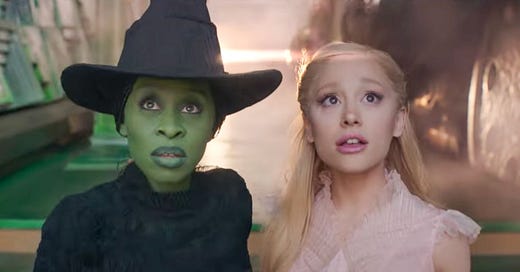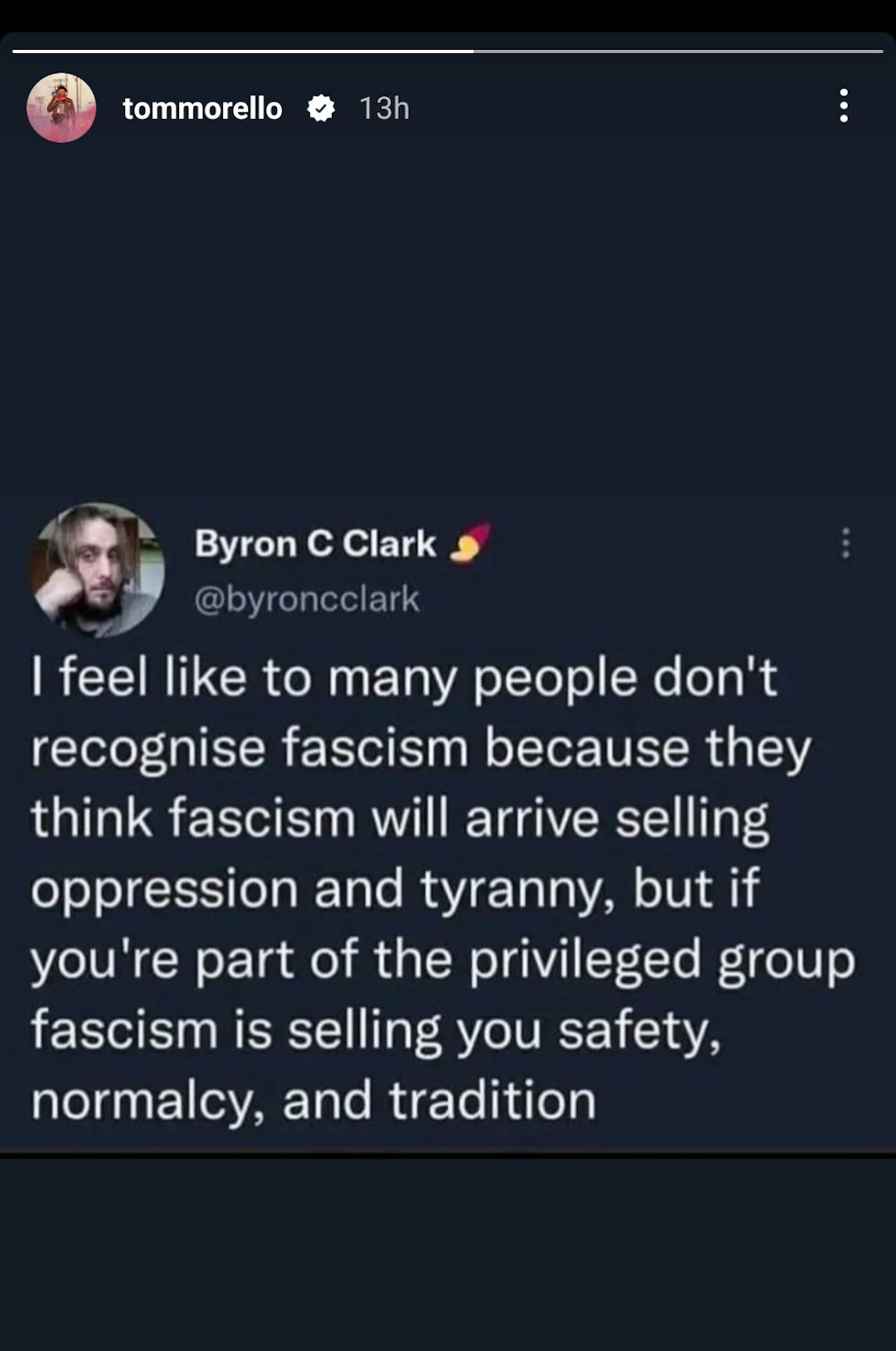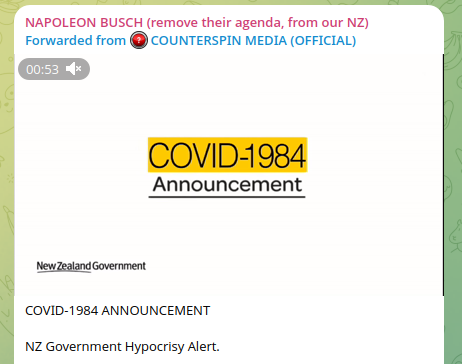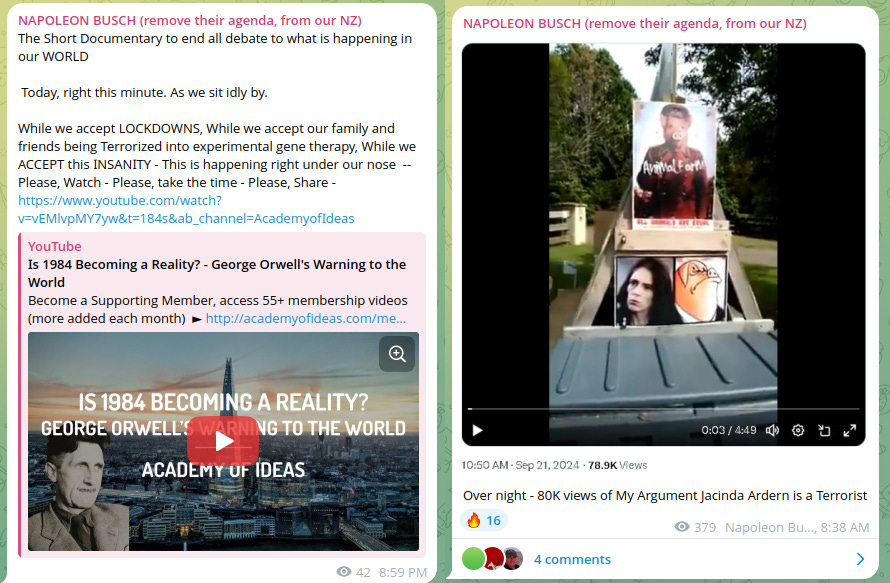Wicked may be the subversive fantasy we need right now
A story where we are made to reconsider someone we've always thought of as the villain has arrived at the right time
No paywall on this one, think of it as a holiday gift. I’ll be taking a short break and be back in the new year.
An odd thing about having a social media post go viral is that rather than it being a fleeting 15-minutes-of-fame type event, it will get discovered by a new audience every so often, and go around again. When that happens, I’ll often have my own post shared with me by a contact who has seen it for the first time in their particular corner of the internet. Or sometimes, several people will share it with me saying, “Hey, did you see Tom Morello from Rage Against the Machine shared your tweet in his Instagram story?”
I’m pleased to see this thought, that I tapped out while on a coffee break not expecting it too get much attention, even if it’s annoying to be reminded I used the wrong ‘too’ every time I see it. It resonated, I suspect, during an era when authoritarianism in its many forms was highly visible. In 2022, the year I posted that tweet, 72% of the world's population was living under autocratic regimes. What was on my mind though, was fiction.
New Zealand’s conspiracist crowd seem to love dystopian fiction, the works of George Orwell in particular. During the pandemic, Counterspin Media issued satirical “COVID-1984” announcements, referencing the most common book for people to lie about having read.
The Biggest Orwell misunderstander though is no doubt Nick Busch. Busch has adopted the moniker Napoleon, after the antagonist of Orwell’s Animal Farm. Based on Joseph Stalin, the character uses military force to consolidate his power over the other animals. During the Jacinda Ardern prime ministership, Busch drove around Waiuku south of Auckland with a trailer comparing Ardern to… presumably also Napoleon? It’s a little unclear.
The appropriation of Orwell’s works by those on the fringe right is ironic given that Orwell’s leftist politics were hardly a secret. “The Spanish war and other events in 1936-37 turned the scale and thereafter I knew where I stood”, he wrote in 1946, between the publication of Animal Farm and 1984. “Every line of serious work that I have written since 1936 has been written, directly or indirectly, against totalitarianism and for democratic socialism, as I understand it. It seems to me nonsense, in a period like our own, to think that one can avoid writing of such subjects.”
Busch does not appear to have the greatest level of media literacy. During the occupation of parliament grounds by a mix of anti-vaccine activists and far-right affiliated groups in early 2022, he asked on Telegram “Can someone ASK the PA people at WELLINGTON to PLAY this at MAX Volume” with a link to the music video for the 1998 Manic Street Preachers song If You Tolerate This, Your Children Will be Next. The song is inspired by the Welsh volunteers who joined the International Brigades and went to fight in the Spanish civil war against the nationalists led by Francisco Franco. The music video opens with the first bars of communist anthem The Internationale played on a music box.
Perhaps though, it’s easy for someone of any political persuasion to relate to Winston Smith, the protagonist of 1984. We all imagine that in the face of a tyrannical regime we’ll be the free-thinking hero who stands against it. Such were the young heroes of the dystopian young adult fiction that boomed in the 2010s. The popularity of this genre was short-lived. According to Bashirat Oladele, the problem was it never evolved. “Book after book and film after film laid out the same tropes, with the same types of characters all suffering the same generic oppression and experiencing the same teen love triangles.”
Wicked, the recently released movie adaptation of the hit musical that itself is adapted from Gregory Maquire’s 1995 Novel Wicked: The Life and Times of the Wicked Witch of the West, offers up a very different kind of anti-tyranny story. Maquire took an existing world, Oz, from L Frank Baum’s Oz books published at the beginning of the twentieth century, and told a new story where the hero is the character we’re so used to thinking of as the villain (thanks in large part to the 1939 film that’s so timeless four or five generations of children have grown up watching it).
The Oz of Wicked is not the dreary Airstrip One of 1984 or District 13 of The Hunger Games, but the same fantastic world whose technicolor brilliance wowed audiences for seventy-five years. Oppression exists in the merry old land of Oz, but it’s not something that affects every Ozian. After Doctor Dillamond, a talking goat and a professor at Shiz University, is shown meeting with other Animals to discuss the increasingly dangerous position they are finding themselves under the Wizard’s rule, the students of Shiz are shown attending the Ozdust Ballroom. Tyranny for some. Ballroom dancing for others.
It’s a pivotal scene in the film (and was an emotional one for the actors), the scene where Elphaba Thropp, the would be “Wicked Witch of the West” is finally accepted by her peers after going through life marginalised for being different- in this story, for being born with green skin. The acceptance is fleeting however, when Elphaba meets the Wizard and learns he is the one behind the oppression of the Animals of Oz she takes an uncompromising position, refusing to use her magic abilities for tyranny despite what the Emerald City can offer her in return.
Watching Wicked the audience is expected to side with Elphaba. The story flips the script on the one we know so well. “Dorothy, the protagonist of the [Wizard of Oz] story, represents an individualized ideal of the American people.” wrote the historian Quentin P. Taylor in a piece examining the (debated, but fascinating) idea that the original Wizard of Oz tale was a parable for the politics of its time. There are of course, many people who have been excluded from the ideal American people. Speaking with Indywire, director Jon M. Chu was philosophical; “The storyteller has been unveiled and now the story we’re sitting in, we’re wondering, ‘Was this ever true?’ Is the yellow brick road that my parents talked to us plenty [of] times about in the ‘Wizard of Oz,’ when I was growing up as immigrants, was that a real thing? Or maybe it was never made for us?” Actress Marissa Bode, who plays Elphaba’s sister Nessarose in the film, has also spoken about existing outside the idealised America
“It took me 20 years to openly acknowledge my queerness to the people I am closest to, even though internally I have always known who I am and who I am attracted to. I grew up in a small town in the Midwest and though I love a lot of the community there, not everyone was or is accepting of queerness. On top of being one of a very, very few people of color at my school and having a physical disability, admitting queerness was just one more thing to make me feel “othered.” So I hid it. Upon graduating high school, a few of my peers came out publicly. Which was one of the reasons I was emboldened to come out as well. This is why representation is so important, it helps others feel less alone.”
In a much-memed interview, Tracy E. Gilchrist, former Editor-in-Chief of The Advocate, an American magazine covering LGBT-interest topics, told Wicked stars Ariana Grande and Cynthia Erivo that as someone in queer media she was seeing people taking the lyrics of Defying Gravity, the finale of the film (the first of two), and holding space with it. It’s not surprising that the queer community has seen themselves in a character who is at first ostracised for being different and later the target of propaganda from the political establishment.
Gregory Maquire, himself a gay man, recently told Them that subtext about Elphaba’s sexuality was intentional, as were lines in the book that left open the possibility that she may be intersex or transgender.
“I do sow seeds of possibility there. But I will tell you that the reason I sowed those seeds is that I wanted this book to be an examination about how we think of people as the end result of trauma, and that in fact, we are all larger than our traumas. So, I put right at the very beginning the moment she's born, there's a question, does she have both sex organs? Maybe that was just a trick of the light? Well, you could wonder for the rest of her life and yours whether she did or not. But whether she did or not would not change the path that she had to go on.”
You don’t have to be gay or trans to relate to Elphaba’s story in Wicked but it is a story that explicitly takes the side of the marginalised and the scapegoated in a way other dystopian stories have not. That makes it a well timed one for the current political moment.






